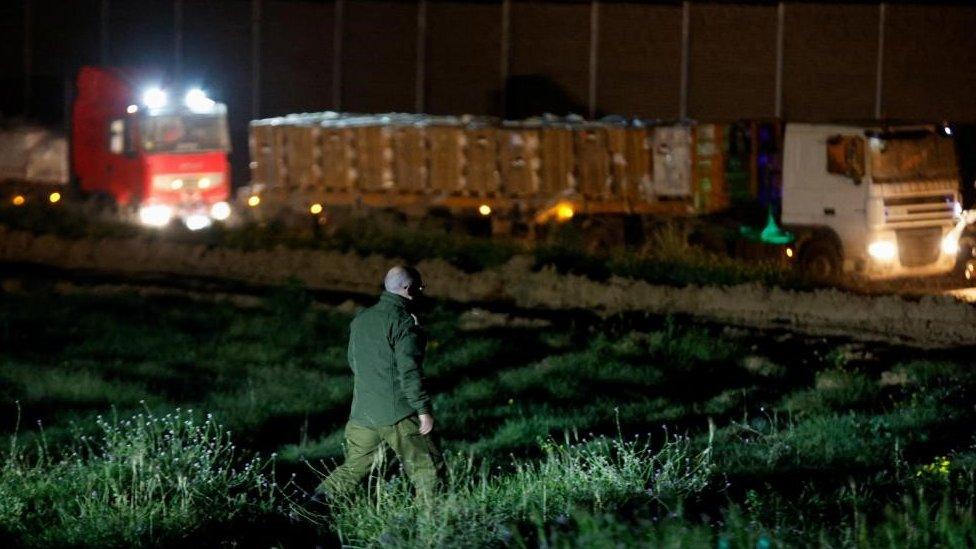Israel says UN resolution damaged Gaza ceasefire talks
- Published
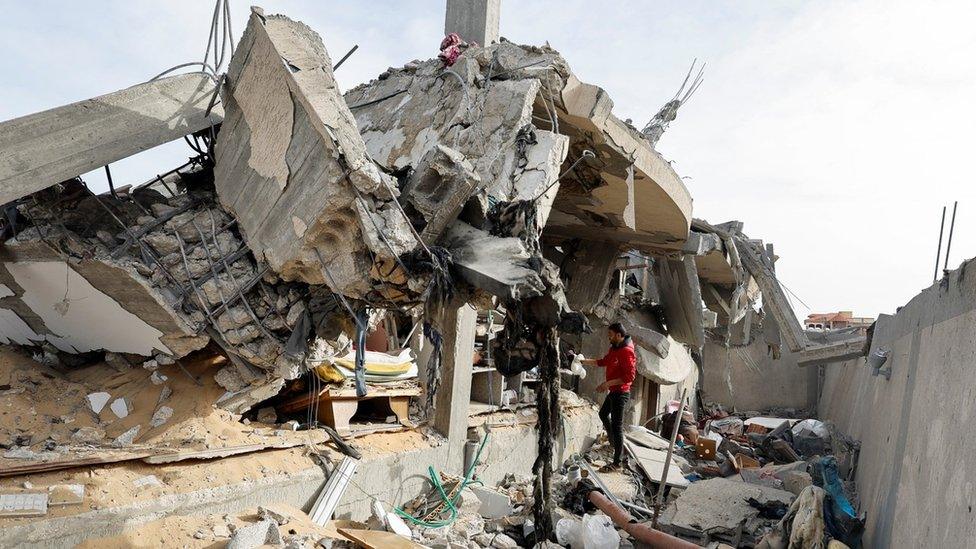
Displaced Palestinians were reportedly killed in an overnight Israeli air strike on a building in Rafah
Israel says Hamas's rejection of a current proposal for a Gaza truce deal with Israel shows the "damage" done by the UN Security Council resolution demanding an immediate ceasefire.
Prime Minister Benjamin Netanyahu's office said Israel would not surrender to what it called the Palestinian armed group's "delusional demands".
They include an end to the war and the complete withdrawal of Israeli forces.
The US called the Israeli statement "inaccurate in almost every respect".
A state department spokesman insisted that Hamas's response had been prepared before the Security Council vote on Monday.
The Israeli military meanwhile said it had confirmed that the deputy leader of Hamas's military wing, Marwan Issa, was killed in a strike on a tunnel complex beneath Nuseirat refugee camp about two weeks ago.
"We have checked all the intelligence," spokesman Rear Admiral Daniel Hagari said. "Marwan Issa was eliminated in the strike."
Hamas political official Izzat al-Rishq said he had "no confidence" in the Israeli claim and that the group's military leadership would have the "final say".
Rear Admiral Hagari described Issa as the group's "number three" and "one of the organisers" of Hamas's attacks on southern Israel on 7 October, when about 1,200 people were killed and 253 others taken hostage.
More than 32,400 people have been killed in Gaza since then, including 81 people in the past 24 hours, according to the Hamas-run health ministry.
Israel reacted furiously after the UN Security Council adopted for the first time a resolution calling for an immediate ceasefire in the war in Gaza following months of deadlock over the issue.
Fourteen council members, including the UK, voted in favour of the text, which also demanded the unconditional release of all remaining hostages and an urgent expansion of humanitarian aid deliveries.
The US - Israel's closest ally and military supporter - criticised the resolution for failing to condemn Hamas for the 7 October attacks.
But in a sign of its increasing frustration at the way Israel is conducting the war, the US abstained, saying it fully supported the key objectives.
In protest, Israel cancelled a planned visit by an Israeli delegation to Washington to discuss its planned ground offensive in the southern city of Rafah, where more than a million people have sought shelter. The US has warned that a full-scale assault could cause a humanitarian catastrophe.
Later, Hamas put out a statement rejecting the latest truce plan put forward by mediators from the US, Qatar and Egypt at indirect talks in Doha.
The group said it was sticking to its original demands for "a permanent ceasefire that would lead to a full withdrawal" of Israeli forces from Gaza and the return of displaced Palestinians to their homes.
On Tuesday morning, the Israeli prime minister's office said Hamas's stance "clearly demonstrates its utter disinterest in a negotiated deal and attests to the damage done by the UN Security Council's resolution".
"Israel will not address Hamas's delusional demands," it added. "Israel will pursue and achieve its just war objectives: Destroying Hamas's military and governmental capacities, release of all the hostages, and ensuring Gaza will not pose a threat to the people of Israel in the future."
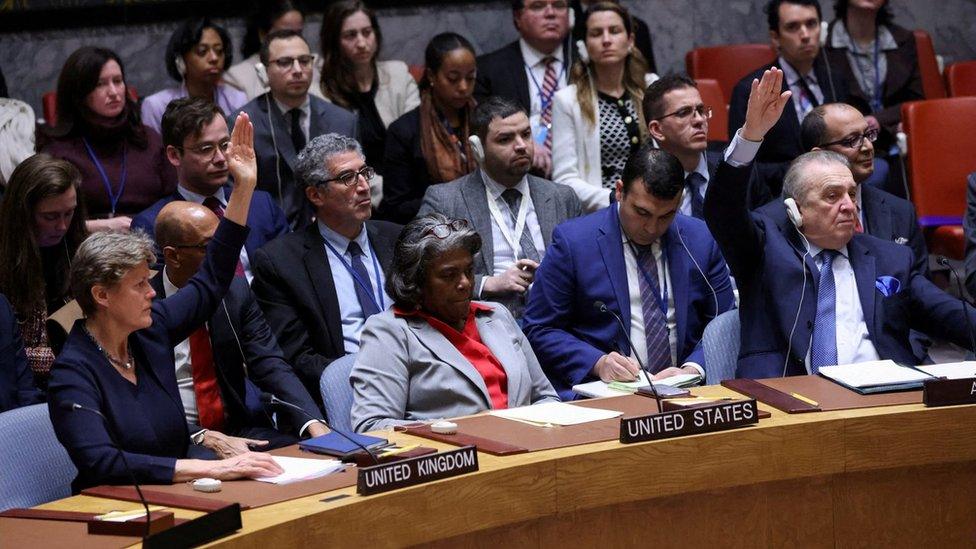
The UK was one of 14 countries who voted in favour of the Security Council resolution, while the US abstained
But US state department spokesman Matthew Miller rejected the criticism.
"That statement is inaccurate in almost every respect and it is unfair to the hostages and their families," he told reporters in Washington.
"The description of Hamas's response that has been aired in the public is all from news reports. It's not the actual substance of the response. I can tell you that response was prepared before the UN Security Council vote, not after it."
Qatar's foreign ministry spokesman, Majed al-Ansari, told a news conference in Doha that the indirect talks "are ongoing, they have not stopped".
"There is no timetable for negotiations, but we are continuing with our partners in mediation efforts," he said, adding that they were currently taking place "at the level of technical teams".
However, Israeli media and Reuters news agency cited Israeli officials as saying that Israel had recalled its negotiating team from Qatar after 10 days of talks.
Hamas's political leader, Ismail Haniyeh, said during a visit to Iran - which arms and funds the group - that the resolution showed Israel was experiencing "unprecedented political isolation".
During a week-long ceasefire in late November, 105 hostages were freed in return for some 240 Palestinian prisoners in Israeli jails.
The latest deal rejected by Hamas reportedly proposed a six-week pause in the fighting and the release of 40 of the hostages still being held by Hamas in exchange for as many as 800 Palestinian prisoners.
There was no indication of a let-up in the war on the ground in Gaza, with the latest Israeli air strikes reportedly killing dozens of Palestinians.
Palestinian media and local health officials said at least 18 people, including nine children, were killed in a strike on a residential building on the outskirts of Rafah. They said the home in the Musabah area belonged to the Abu Naqira family and that dozens of displaced people had been sheltering there.
In northern Gaza, members of the Abu Hasira family told Reuters news agency that about 30 people had been killed in a strike on a family compound near Gaza City's al-Shifa hospital.
Israel's military said on Tuesday morning that it had struck 60 targets over the previous 24 hours, including "terror tunnels, terrorist infrastructure, and military structures in which armed terrorists were identified".
It added that Israeli forces were also "continuing to conduct precise operational activity in the al-Shifa hospital area", eight days after they began a raid targeting Hamas and Islamic Jihad fighters it said had regrouped there.
Palestinians and aid groups say the fierce fighting is endangering patients, medics and displaced civilians trapped inside with few supplies. The military said 175 "terrorists" have been killed and that no civilians have been harmed.
Watch: Gazans reportedly drown after video shows rush for aid drop that landed in sea
Also on Tuesday, Gaza's Hamas-run government media office said 18 Palestinians had been killed while trying to collect aid that was airdropped over northern Gaza, amid warnings of an imminent famine there.
Twelve people drowned when they went in the sea to retrieve food packages, according to a statement. The other six were trampled to death in "stampedes" when other aid packages landed on the ground, it said.
The statement provided no further details about the incidents. However, video footage appeared to show the drowning of at least one person after an airdrop off a beach near the northern town of Beit Lahia on Monday.
The Pentagon said three of the 18 bundles of aid airdropped by US aircraft over northern Gaza on Monday had parachute malfunctions and fell into the water, but could not confirm if anyone was killed, Reuters reported.
In another development, the family of Israeli hostage Uriel Baruch was informed by the military that he had been killed and that his body was being held by Hamas, according to the Hostage and Missing Families Forum, external.
The 35-year-old father of two was injured and kidnapped during the attack on the Supernova music festival on 7 October.
Meanwhile, a female hostage who was released in November told the New York Times that she was sexually assaulted at gunpoint by a guard in Gaza, external.
Amit Soussana, 40, is the first former hostage to say publicly that she was sexually abused in captivity, according to the newspaper.
Hamas has denied that its members have sexually abused people in captivity. But this month, a UN team said it found "clear and convincing information" that hostages had been subjected to sexual violence and that there were "reasonable grounds to believe that such violence may be ongoing".
- Published26 March 2024
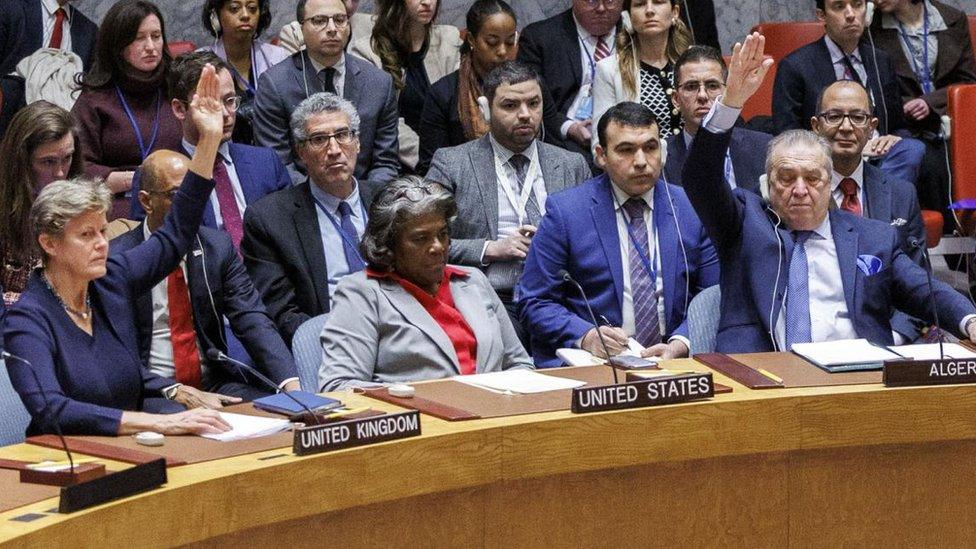
- Published26 March 2024
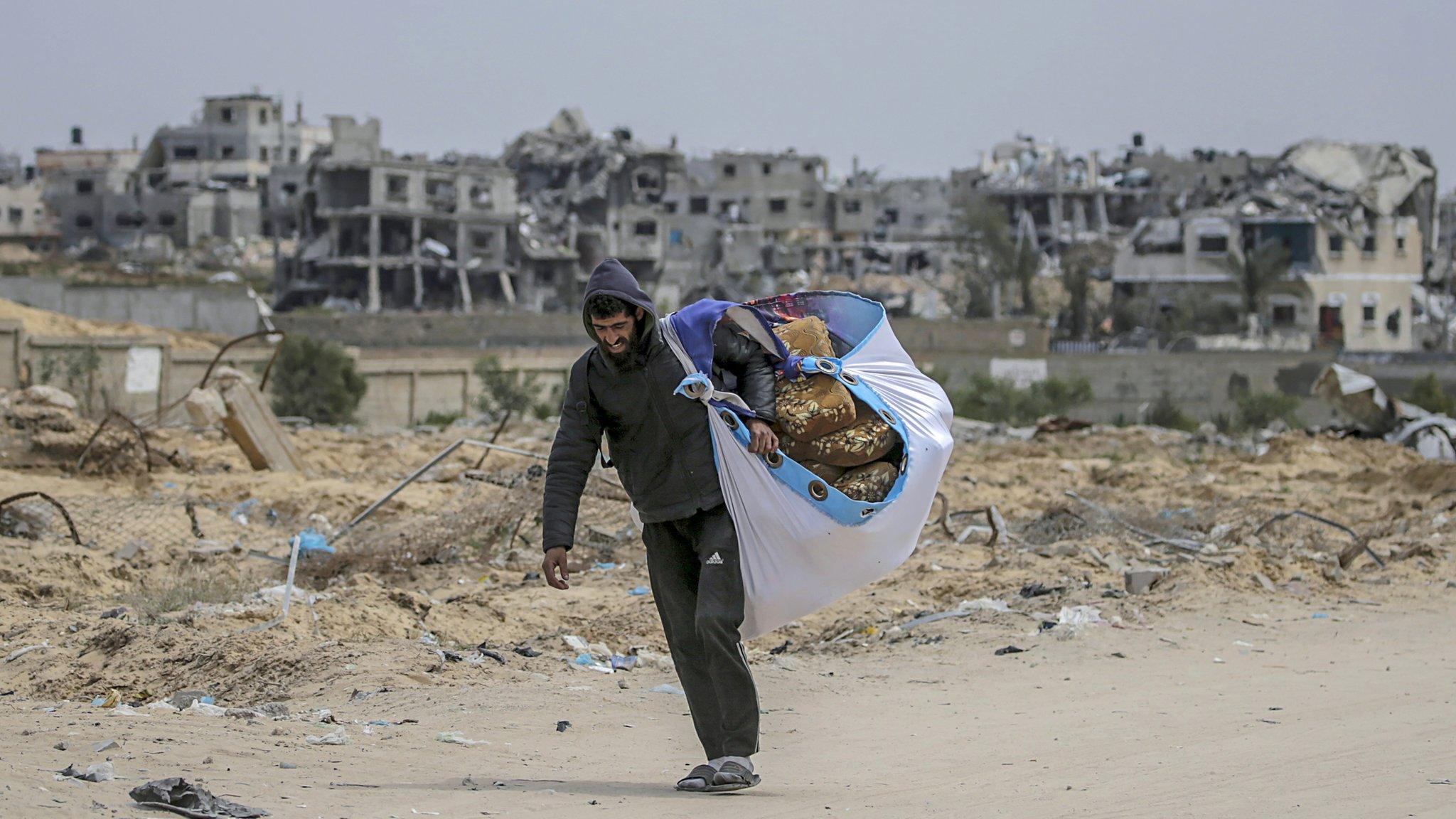
- Published25 March 2024
